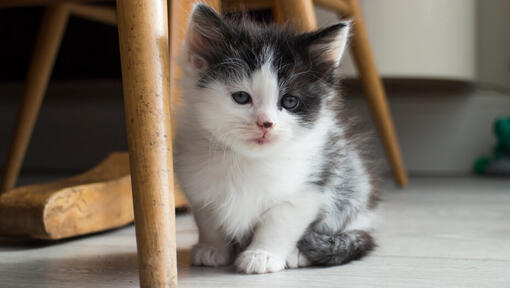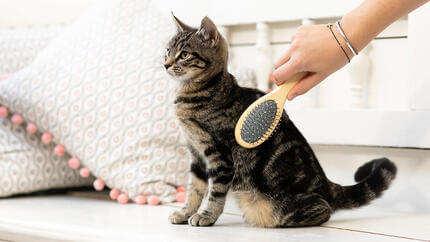

There are so many things to learn for a new kitten making their first steps into the world. Discovering it all by themselves can be a little bit scary, but luckily you can do a lot to help them learn the ropes of their new life. These are the basics of kitten socialisation.
The world is such a big place for a kitten just starting to figure out where exactly they fit in it. A kitten’s early life is noisy, busy and full of new experiences. There are humans everywhere, other kittens roaming around, older cats, objects big and small, plus all sorts of startling strange sounds and smells.
Deciphering what they all mean will take a little while which is what the period known as kitten socialisation is for. All of this can be overwhelming when you get a new kitten, as they arrive in your house and everything is new to them. Find out how to turn your shy ball of fur into a confident and happy adult cat and help your kitten learn life’s first lessons quickly.
What is kitten socialisation?
Kitten socialisation is the period of time early on in a cat’s life when they start to learn what is safe in their environment by getting familiar with different experiences, people, pets and even sounds. Exposure to new things from the beginning is crucial for cat socialisation, but make sure not to overwhelm the small bundle of joy with more information than they can handle.
When should you teach kitten socialisation?
Although the exact timeline for kitten socialisation is still being debated among specialists, the first 8-10 weeks are usually considered crucial for the process of socialisation. Kittens are like a sponge for new information, especially in their early days, which means there will never be a better time to show your kitten the ropes of life in general, and family time in particular.
It is very possible that by the time you get to meet your new kitten the socialisation period has long passed. In this case it’s at the breeder’s house or at a rescue centre where they will have learned (or not) the first things about people and what role they play in a cat’s life.
But this doesn’t mean cats have learned all they need to know about the world around them. It’s important to check with the breeder to see if there is anything in particular you need to focus on. After all, if your new kitten can’t help but duck for cover every time the alarm clock goes off, you want to know about it early on so you can continue the kitten socialisation job at home.
Although the first weeks are essential, don’t forget that your kitten is likely to deal with new things long after their first birthday. Cat socialisation doesn’t stop after the 10-week marker, especially when the time comes to move into your home.
Top tips on how to socialise your kitten
Chances are that the first time you’ll welcome the new kitten into your home, you’ll notice they’re stepping into their new life somewhat reluctantly. They might be a bit shy or even look frightened by all the attention they’re getting. Your first instinct will be to lift the ball of fur and comfort them, but this might actually make matters worse as it can add to their panic. Here are some useful tips for socialising your kitten with the least amount of distress for everyone involved.
Keep everyone calm
Once they’re rested and are confident in their room, then it’s time to meet their new human family. This is obviously a very exciting moment, but do try to keep everyone calm. Before introducing a new kitten to the home, everyone should sit still on the floor and agree on one rule - only touch the kitten if the kitten comes to you.
No grabbing
There mustn’t be any grabbing or arguing between the kids, or it will frighten your pet. If the kitten tries to hide, coax them out with a toy or a treat to encourage them to be sociable, but never grab or force them.
Watch the kids
If you think you’re excited about your new kitten, just imagine how children feel! Meeting the kids is a big step for your kitten’s socialisation.
To get their friendship off on the right footing, teach young children how to pick up and support the kitten’s weight properly, and how to stroke the cat gently.
Toddlers often 'pat' rather than ‘stroke’, which can be uncomfortable or even painful for tiny kittens. Teach them where to stroke the kitten - the top of the head and along the back. Although tummies are irresistible when a kitten is rolling and playing, most are rather sensitive about this area and may lash out. And remind the kids to leave kitty’s tail well alone – and never to pull it.
Offer some privacy
Although it can be tempting to watch a beautiful kitten sleep, they do need some privacy. Make sure they have their own little bed tucked away in a quiet spot. They might even choose this spot themselves. Make sure they’re left alone when they’re eating, going to the toilet or sleeping – and keep their litter tray away from toddlers. You certainly don’t want your children playing with anything they find in it!
Wash your hands after handling the kitten and especially after cleaning the litter tray, and encourage little ones to do the same.
Introducing a kitten to other pets
Kitten socialisation also means getting the new kitten comfortable around other four-legged housemates or guests. The secret to introducing your new kitten to other pets in the house is patience. Never put them in a position where they could fight with your other pets.
Cats and dogs often learn to love one another, or at least live together without problems, but the same can’t be said of all pets. Keep pets like rabbits, guinea pigs, mice, birds and reptiles away from your kitten at all times, as a hunting cat can see them as prey.
Animals recognise each other partially through smell. So, when introducing your kitten to a dog or a cat, try to intermingle their scent. Stroke one and then the other so the scent is transferred, swapping their bedding as well. This way they will start to associate nice things (sleeping comfortably and being cuddled) with the other animal's smell.
Use a pheromone spray
Another good trick for a good start to kitten socialisation is to use synthetic pheromone spray and plug-in pheromone diffusers, as these will let your kitten know the area is safe and will help them to feel relaxed and peaceful. If using diffusers, distributing one or two throughout the house should be enough.
Establish a routine
Once your kitten’s found its confidence, it will soon be dashing around the house. Watch your step – they can appear suddenly from nowhere!
They’ll be up for plenty of play but will still need their naps, so give them a nice quiet spot where they can cuddle up without being disturbed.
It will help them settle in if you can stick to a routine, particularly with feeding, play and stroking.
If you’ve followed the kitten socialisation advice but are still having problems integrating your kitten into your home, speak to your vet. They may recommend a feline behaviourist.









